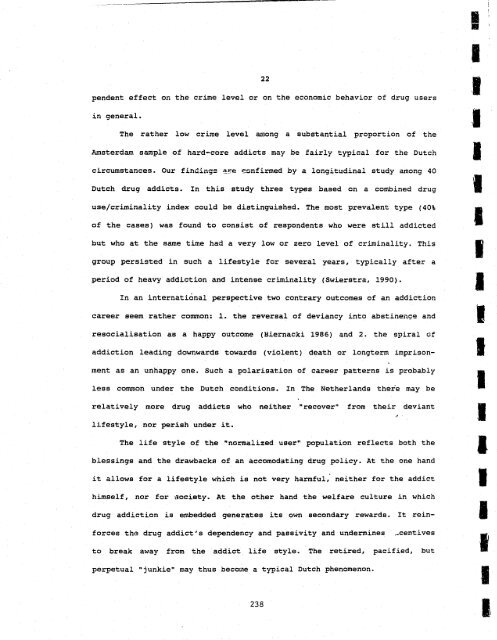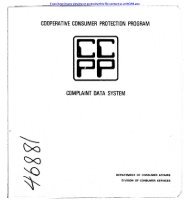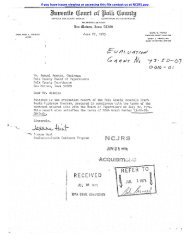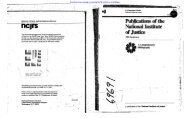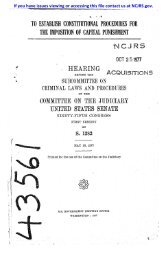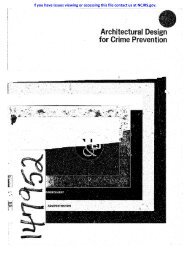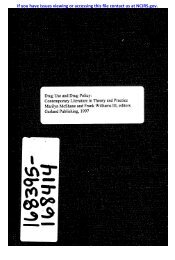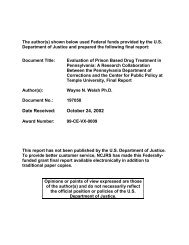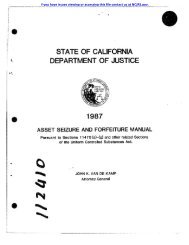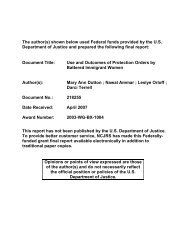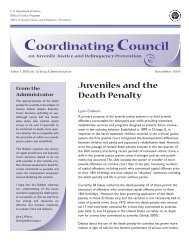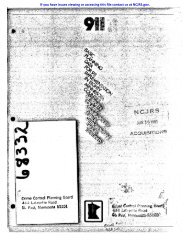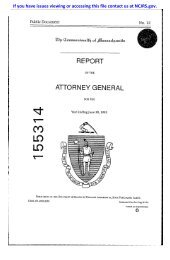- Page 1 and 2:
If you have issues viewing or acces
- Page 3 and 4:
TABLE OF CONTENTS TOPIC PREFACE EXE
- Page 5 and 6:
I I I I I I I I I I I I I I I I I I
- Page 7 and 8:
users of cocaine has gone steadily
- Page 9 and 10:
Sacramento has become the methamphe
- Page 11 and 12:
procedures. Our survey has examined
- Page 13 and 14:
at the number of caretakers they ha
- Page 15 and 16:
parole caseloads. Those coming out
- Page 17 and 18:
Resource distribution is fraught wi
- Page 19 and 20:
examine the data systems in existen
- Page 21 and 22:
We take a different policy approach
- Page 23 and 24:
ecause of the geographic distance.
- Page 25 and 26:
Susan Pennell - San Diego Kiku Anno
- Page 27 and 28:
DRUG ABUSE INFORMATION AND MONITORI
- Page 29 and 30:
Mary Ann Lewis UCLA School of Nursi
- Page 31 and 32:
COMMUNITY EPIDEMIOLOGY WORK GROUP I
- Page 33 and 34:
HIGHLIGHTS The following highlights
- Page 35 and 36:
HlghUghu • In Hawaii, dc2ths rela
- Page 37 and 38:
~~~-----.---- () ~ C) W 8 [.., .. ~
- Page 39 and 40:
COCAINE 1 . Eastern Region EXECUTIV
- Page 41 and 42:
______________ Eu_CUl_ive_S~,JlU'Y:
- Page 43 and 44:
CIty .... . eta .'.I\;·~·:iil::;:
- Page 45 and 46:
In Chicago crack cocaine use is wid
- Page 47 and 48:
In San Diego, whites accounted for
- Page 49 and 50:
EuCUlive Summary: CocoiM V'''''''''
- Page 51 and 52:
wClilive Summary: Heroin The' numbe
- Page 53 and 54:
EuCUlive Summary: Heroin cocaine us
- Page 55 and 56:
Eucwive SIIntI1ID1y: lIeroin combin
- Page 57 and 58:
Area C~Ofado Hon04uJu Los AnGeles P
- Page 59 and 60:
following an increase; aVailability
- Page 61 and 62:
Ex.eClllive Summary: Marijuana TabI
- Page 63 and 64:
Eucutive Summary: Marijuana Table 2
- Page 65 and 66:
EuCUl;ve SIllTllM1'Y: Marijuana ---
- Page 67 and 68:
Typically, metharnphetanrine ER men
- Page 69 and 70:
Table 29. Pwcentsgo and rri by nOl'
- Page 71 and 72:
mentions-the leading mentioned psyc
- Page 73 and 74:
with cigarette papers, and sold as
- Page 75 and 76:
----------------------~- ~~--~-~~--
- Page 77 and 78:
APPENDIX D DRUG/LAB SEIZURE ACTIVIT
- Page 79 and 80:
BNE DRUG SEIZURE ACTIVITY REPORT '-
- Page 81 and 82:
"'Other Labs include: , Designer Dr
- Page 83 and 84:
. I OMBNo. ADMS Fonn 08 State: TR
- Page 85 and 86:
BNE Drug Seizure Activity Report 19
- Page 87 and 88:
(Xl c: LSD SEIZURE ACTIVITY REPORT
- Page 89 and 90:
LAB SEIZURE ACTIVITY REPORT 00 P- "
- Page 91 and 92:
'DE/! 'D~ ()~ February, 1991 NIJ f
- Page 93 and 94:
';et:Weat 7~ 'P~ 00 co I I CSA PEN.
- Page 95 and 96:
May 25, 1988 June 23, 1985 Aug. 31,
- Page 97 and 98:
.: ".:.: Heroin Cocaine Marijuana H
- Page 99 and 100:
----~-~---~~-~----- ~ VI o EXHIBIT
- Page 101 and 102:
9,500 EXHIBIT 8 LOS ANGELES HEROIN
- Page 103 and 104:
...... VI 00 EXHIBiT 10 LOS ANGELES
- Page 105 and 106:
Exhibit 3 DRUG TREATMENT ADMISSIONS
- Page 107 and 108:
YEAR 1998 1989 1990 1991 1992 QUART
- Page 109 and 110:
APPENDIX G I • TRENDS EOR DRIIG A
- Page 111 and 112:
County Reports: San Diego, Californ
- Page 113 and 114:
County Repons: San Diego, Californi
- Page 115 and 116:
County Repons: San Diego. Californi
- Page 117 and 118:
EXHIBIT 1 ADMISSIONS TO COUNTY FUND
- Page 119 and 120:
EXHIBIT 3 COCAINE TREATMENT ADMISSI
- Page 121 and 122:
EXHIBIT 5 AMPHETAMINE TREATMENT ADM
- Page 123 and 124:
EXHIBIT 7 ALCOHOL ADMISSIONS TO COU
- Page 125 and 126:
APPENDIXH High Risk Alcohol and Dru
- Page 127 and 128:
Findings Trends in Risk Categories
- Page 129 and 130:
Frequent and Heavy Use by User Grou
- Page 131 and 132:
Cigarette Smoking and User Groups T
- Page 133 and 134:
Use of Tobacco, Alcohol and Illicit
- Page 135 and 136:
Survey Instrument The questionnaire
- Page 137 and 138:
10 9 CI) 8 c: Q) Q) I- 7 ;;;: ....
- Page 139 and 140:
75 70 III 65 c: Q) ~ 60 < 55 "- ...
- Page 141 and 142:
57.4% increase in those who had use
- Page 143 and 144:
- - - - - - - -. - - - - - ------ T
- Page 145 and 146:
FIGURE 7 Drinking to Intoxication A
- Page 147 and 148:
drugs (such as cocaine, LSD, amphet
- Page 149 and 150:
Apparently, older friends are a sig
- Page 151 and 152:
drugs (Table 8). Since our survey i
- Page 153 and 154:
All of the options for drinking loc
- Page 155 and 156:
students' I\eports regarding fighti
- Page 157 and 158:
TABLE 13 Situations of Teens' Drug
- Page 159 and 160:
Yolo County teens, the lifetime pre
- Page 161 and 162:
APPENDIX I DRUG USE FORECASTING (DU
- Page 163 and 164:
--------------- Introduction I •
- Page 165 and 166:
Drug Use Excluding Marijuana • A
- Page 167 and 168:
30 10 Figure 5 DUF ADULT AMPHETAMIN
- Page 169 and 170:
Arrest Charge and Drug Result For t
- Page 171 and 172:
Table 2 ARREST CHARGE AND DRUG RESU
- Page 173 and 174:
"E \I) u iii Q. Figure 9 DUF ADULT
- Page 175 and 176:
CP ~ 'iii 0 Q.. C CP !: (I) Q.. 20
- Page 177 and 178:
Nationwide DUF Site Comparison Alth
- Page 179 and 180:
Why San Diego maintains higher rate
- Page 181 and 182:
County Alameda Amador Butte Calaver
- Page 183 and 184:
San Luis Obispo $13.921 San Mateo S
- Page 185 and 186:
COUNTY MASTER PLAN FUNDING ASSISTAN
- Page 187 and 188:
California Department of Correction
- Page 189 and 190:
---------------------------"'----.-
- Page 191 and 192: California Department of Correction
- Page 193 and 194: California Department of Correction
- Page 195 and 196: California Department of Correction
- Page 197 and 198: California Department of Correction
- Page 199 and 200: California Department of Correction
- Page 201 and 202: California Department of Correction
- Page 203 and 204: California Department of Correction
- Page 205 and 206: California Department of Correction
- Page 207 and 208: California Department of Correction
- Page 209 and 210: California Department of Correction
- Page 211 and 212: APPENDIX M en :s ::. w I- tI) ::l >
- Page 213 and 214: OBJECTIVE AND APPROACH N o ex> Reco
- Page 215 and 216: en w :l en en - ..J
- Page 217 and 218: APPENDIX N IMPROVING AND INTEGRATIN
- Page 219 and 220: High School Senior Survey is specif
- Page 221 and 222: At each step we will need to • do
- Page 223 and 224: I -I INTRODUCTION 2 The Netherlands
- Page 225 and 226: 4 actions has expressly been minimi
- Page 227 and 228: 6 Finally general practitioners pre
- Page 229 and 230: 8 DESIGN OF THE STUDY The fieldwork
- Page 231 and 232: PATTERNS AND LEVELS OF DRUG USE' 10
- Page 233 and 234: 12 SOURCES OF INCOME During one mon
- Page 235 and 236: 14 multiple regression analysis was
- Page 237 and 238: 16 income. Table 6 shows the result
- Page 239 and 240: 18 habits. The average "dealing jun
- Page 241: 20 join the market of small time pi
- Page 245 and 246: 25 Korf, D.J: Jatten alle junkies?
- Page 247 and 248: TABLE 1: MONTHLY PREVALENCE FOR POL
- Page 249 and 250: FIGURE 1: 29 RELATIVE CONTRIBUTION
- Page 251 and 252: 31 TABLE 4: DETERMINANTS OF CRIMINA
- Page 253 and 254: I I I 33 ~ 6: A CRIMINAL/ECONOMIC ~
- Page 255 and 256: I Volume 4, Number 12 : March19921
- Page 257 and 258: I volume 4, Number 12 March1992) Oc
- Page 259 and 260: STIMULANTS VS. OPIATES IV Stimulant
- Page 261 and 262: HOUSEHOLD SA vs. OA 1989-90, Sacto.
- Page 263 and 264: SEXUAL PARTNERS (SP) - CHARACTERIST
- Page 265 and 266: Percent I I I WHITE 1990 I 80 I I 6
- Page 267 and 268: Percent 1 O.B 0.6 0.4 0.2 o .6 Gene
- Page 269 and 270: Percent 10 8 6 4 2 a 9.1 General Po
- Page 271 and 272: NEEDS - ASSESSMENT - GOALS & OBJECT
- Page 273 and 274: I GOAL STATEMENT: To develop a sing
- Page 275 and 276: TABLE OF CONTENTS Acknowledgements
- Page 277 and 278: Table 1. . Table2. Table 3. Table 4
- Page 279 and 280: Table E-10. Table E-11. Table E-12.
- Page 281 and 282: SUMMARY ----,-------------------" T
- Page 283 and 284: Developmentally disabled offenders
- Page 285 and 286: YOUTH AUTHORI1Y TREATMENT NEEDS ASS
- Page 287 and 288: Both versions of the MMPI and the J
- Page 289 and 290: Demowphic InfonnMi.rul FINDINGS The
- Page 291 and 292: een hospitalized for psychiatric pr
- Page 293 and 294:
impaired, but who has good contact
- Page 295 and 296:
The SCPs, like the ITPs, receive of
- Page 297 and 298:
The Jesness Inventory and the MMPI
- Page 299 and 300:
CONCLUSIONS A total of 851 offender
- Page 301 and 302:
REFERENCES Archer, R. P. (1987). Us
- Page 303 and 304:
APPENDIXB DEMOGRAPIDC DATA FROM TII
- Page 305 and 306:
8·~ __ ----- YA010U (I ·S) ---'--
- Page 307 and 308:
TABLED-3. TOTAL No Attempts One or
- Page 309 and 310:
TABLE E-1. APPENDIXE TABLES RELATI~
- Page 311 and 312:
TABLEE-9. TABLEE-I0. TABLEE-ll. TAB
- Page 313 and 314:
APPENDIXF THE MINNESOTA IvfULTIPHAS
- Page 315 and 316:
Henggeler (1989) mentions that inca
- Page 317 and 318:
APPENDIXG THE JESNESS INVENTORY The
- Page 319 and 320:
APPENDIX T DRUG POSITIVE RATES IN C
- Page 321 and 322:
Second, and perhaps the larger fact
- Page 323 and 324:
.1 As shown in Figure 3, the lowest
- Page 325 and 326:
Usually, one tends to see drugs tha
- Page 327 and 328:
METHADONE PROGRAM CLIENTS PhannChem


